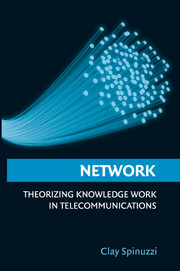Book contents
- Frontmatter
- Contents
- Acknowledgments
- 1 Networks, Genres, and Four Little Disruptions
- 2 What Is a Network?
- 3 How Are Networks Theorized?
- 4 How Are Networks Historicized?
- 5 How Are Networks Enacted?
- 6 Is Our Network Learning?
- 7 Conclusion: How Does Net Work Work?
- Appendix Notes on Methodology
- Works Cited
- Index
2 - What Is a Network?
Published online by Cambridge University Press: 08 August 2009
- Frontmatter
- Contents
- Acknowledgments
- 1 Networks, Genres, and Four Little Disruptions
- 2 What Is a Network?
- 3 How Are Networks Theorized?
- 4 How Are Networks Historicized?
- 5 How Are Networks Enacted?
- 6 Is Our Network Learning?
- 7 Conclusion: How Does Net Work Work?
- Appendix Notes on Methodology
- Works Cited
- Index
Summary
“In the past,” Nardi, Whittaker, and Schwarz tell us, “much work took place in relatively stable settings” (2002, p. 205). In these settings, long-term relationships flourished; workers held long-term or lifelong jobs, maintained steady contacts with other organizations and with the public, and built up considerable expertise (cf. Braverman, 1974). They fulfilled clearly defined roles and developed strong working relationships. They “shared considerable social, cultural, and organizational knowledge that served as a backdrop for work and interaction” (Nardi et al., 2002, p. 205). But recent changes in work, particularly knowledge work, have destabilized these settings: downsizing, automation, flattening of work hierarchies, increasing numbers of relationships between companies, and continual reorganization (p. 206; cf. Deleuze, 1995; Engeström, Engeström, & Vähääho, 1999). One result, Nardi et al. say, is that “many corporations operate in an increasingly distributed manner, with workers, contractors, consultants, and important contacts such as those in the press located in different parts of the country or across the globe” (p. 206; cf. Zuboff & Maxmin, 2004).
This description certainly fits Telecorp in 2000–2001, during my observations. Telecorp was undergoing rapid and sometimes chaotic changes: rapid growth, rapid acquisitions, rapid turnover in workers, rapid adoption of new technologies and new features, all in the rapidly changing landscape of the telecommunications industry. The industry by its nature involves constant collaboration among companies and frequent contact with customers; organizational boundaries are quite porous, with connections at all levels and in all areas.
Information
- Type
- Chapter
- Information
- NetworkTheorizing Knowledge Work in Telecommunications, pp. 31 - 61Publisher: Cambridge University PressPrint publication year: 2008
